Author: Joyce, BlockBeats
Since the emergence of Chatgpt in 2023 and reaching the milestone of 100 million users within just two months, the field of artificial intelligence has become a highly favored track for investment institutions. In the field of cryptocurrency, the combination of distributed systems, cryptography, and artificial intelligence has also attracted significant capital. In 2023, the financing amount for the AI track in the Web3 industry reached 298 million US dollars, surpassing the NFT track.
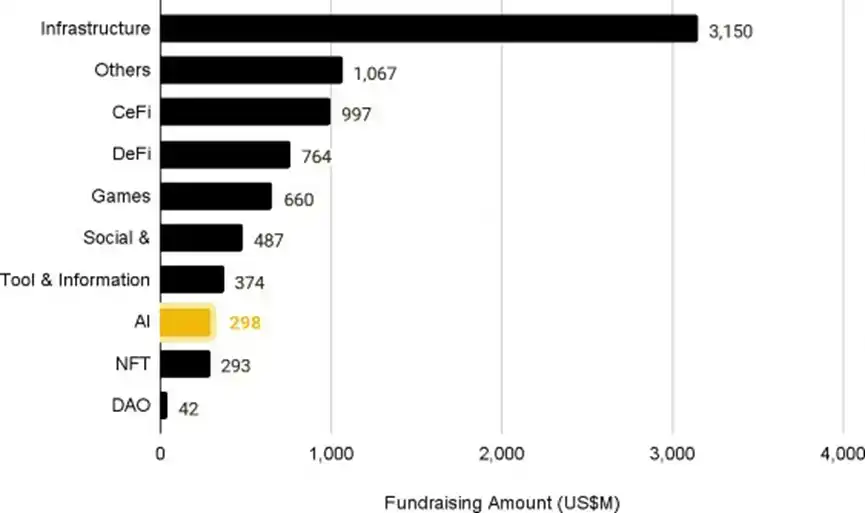
Data Source: Rootdata, Binance Research Institute, as of December 31, 2023
Related Reading: "Binance Research: Latest Data and Development of AI+Crypto"
In November 2023, the decentralized AI computing platform Ritual announced the completion of a $25 million financing round, with Archetype leading the investment and participation from Accomplice and Robot Ventures. It is reported that Ritual aims to create an incentive network to provide power for distributed computing devices to support various applications of artificial intelligence. The funds will be used to build network infrastructure, expand the team, and develop the Ritual ecosystem.
"The integration of artificial intelligence among a small group of powerful companies poses a significant threat to the future of technology. We founded Ritual to end the ecosystem's reliance on a few people, open access to this critical infrastructure, and ensure the construction of a better future for artificial intelligence. Ritual is the decentralized network that the ecosystem needs," said Niraj Pant, co-founder of Ritual, in a statement.
Strong Financing Lineup and Team Background
It is worth noting that Ritual has a strong lineup of financing. Robot Ventures, one of the investors, has a high success rate in its investments, with star projects in each bull market round, such as Optimsim, Compound, Lido, and Eigenlayer. Hypersphere Ventures is also an investor in Worldcoin and Sei network. Public information also shows the participation of notable angel investors such as former Coinbase CTO Balaji Srinivasan.
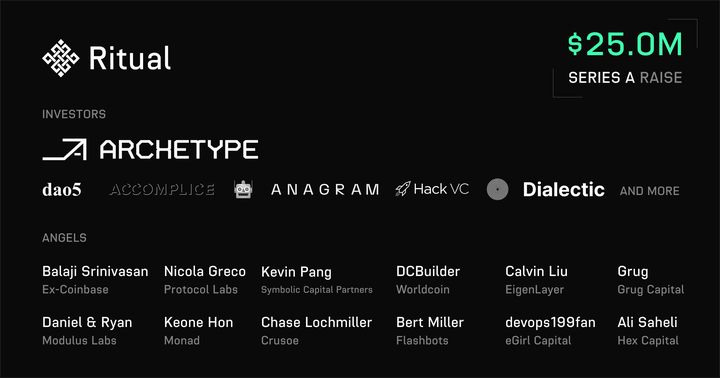
Ritual's advisory team is also star-studded, including NEAR Protocol co-founder and Transformers co-founder Illia Polosukhin ("Attention is All You Need"), and EigenLayer founder and partner Sreeram Kannan. On January 10, BitMEX co-founder Arthur Hayes announced that he had joined Ritual as an advisor.

The Ritual team has years of experience in the cryptocurrency field. The founders are Niraj Pant and Akilesh Potti. Niraj Pant holds a Bachelor of Science in Computer Science from the University of Illinois at Urbana-Champaign. Prior to founding Ritual, Niraj was a general partner at Polychain Capital, a board member of CoinDCX, a Redpoint Capital ambassador, and co-founder and CTO of Source Networks. Akilesh Potti, a graduate of Cornell University, was also a partner at Polychain.
In addition, Ritual's founding member and MEV independent researcher Anish Agnihotr previously worked as a researcher at Paradigm.
Ritual has not yet issued coins and will open source its AI workflow and infrastructure in the coming weeks.
What is Ritual?
Ritual
Ritual brings together a distributed node network that can access computing and model creators, enabling all creators to host their models on these nodes. Then, users can access any model on this network (whether it is LLM or classic ML models) using a universal API, and the network has additional encrypted infrastructure to ensure computational integrity and privacy.
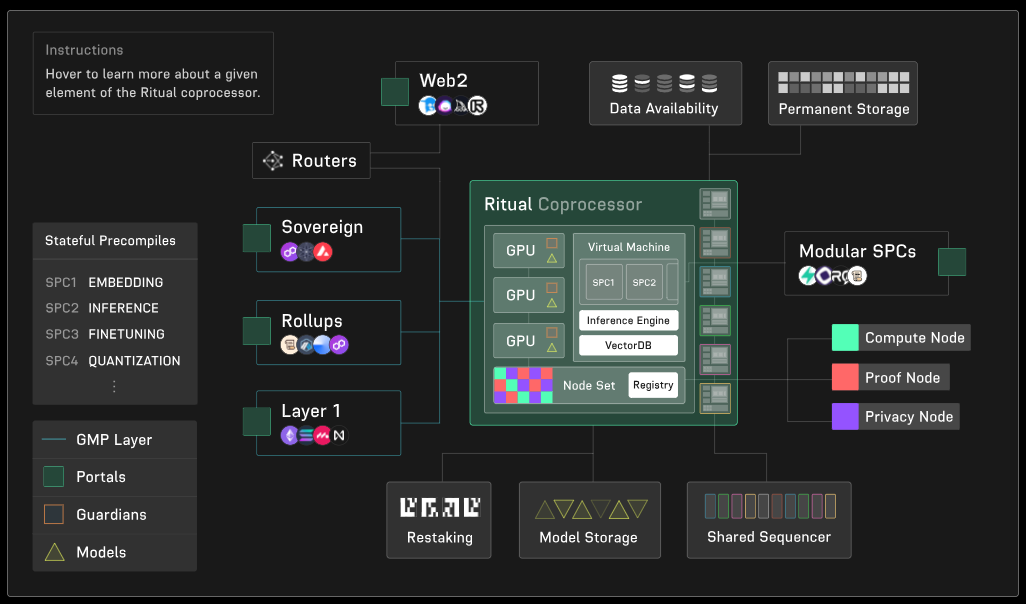
The components of Ritual are as follows:
- Ritual Superchain: A set of sovereign modular execution layers, each layer containing specialized state precompiles (SPC) suitable for arbitrary computations of different categories, mainly focusing on artificial intelligence models, promoting interoperability between existing blockchains and the Ritual Superchain, with the Ritual Superchain acting as an AI coprocessor for all blockchains. The Ritual AI VM not only includes SPCs, but also includes foundational infrastructure to facilitate optimized execution, including inference engine binaries and vector databases.
- Node Set: The Ritual Superchain consists of node categories, each node containing different functionalities and resource requirements. Ritual nodes include canonical full nodes and validator nodes, as well as Ritual-specific nodes (including proof nodes, model cache nodes, and privacy nodes). Ritual proof and privacy nodes can utilize various mechanisms based on the guarantees required by users and the complexity of artificial intelligence models, from proof aspects of ZK to Optimsim, and privacy aspects of FHE to MPC.
- About State Precompiles (SPCs): State precompiles are precompiles with state access permissions. Ritual requires highly optimized operations that can efficiently compute specific functions of various AI models. Some SPCs can be composed as combinations of other SPCs (i.e., fine-tuning and inference). Some SPCs can fully exploit various types of parallelism (i.e., embedding), while others proceed through constructed sequences.
- General Message Passing (GMP): Ritual enables any on-chain application to utilize the execution capabilities of the superchain through compact bidirectional general message passing.
- Portals: Portals are a unique feature of Ritual that allows urgent data evaluation of the source chain through native smart contracts before utilizing the Ritual superchain. Portals optimize static analysis of AI model inputs, localizing computation to the source chain, minimizing data sent over the network.
Infernet
Infernet is the first building block in the protocol and utility suite that Ritual will release. Infernet node v0.1.0 is a lightweight off-chain client for Infernet service computation workloads.
Infernet allows anyone to seamlessly build on top of Ritual and access Ritual's model and computation provider network without permission. Infernet brings artificial intelligence into today's on-chain applications by providing powerful interfaces for smart contracts to access AI models for inference.
Ritual aims to develop Infernet into a modular execution layer suite that interoperates with other foundational infrastructure in the ecosystem, becoming a key point for artificial intelligence in the web3 domain, allowing every protocol and application on any chain to use Ritual's AI coprocessor. Smart contracts can request Infernet to compute some outputs and proofs using given models and functionalities.
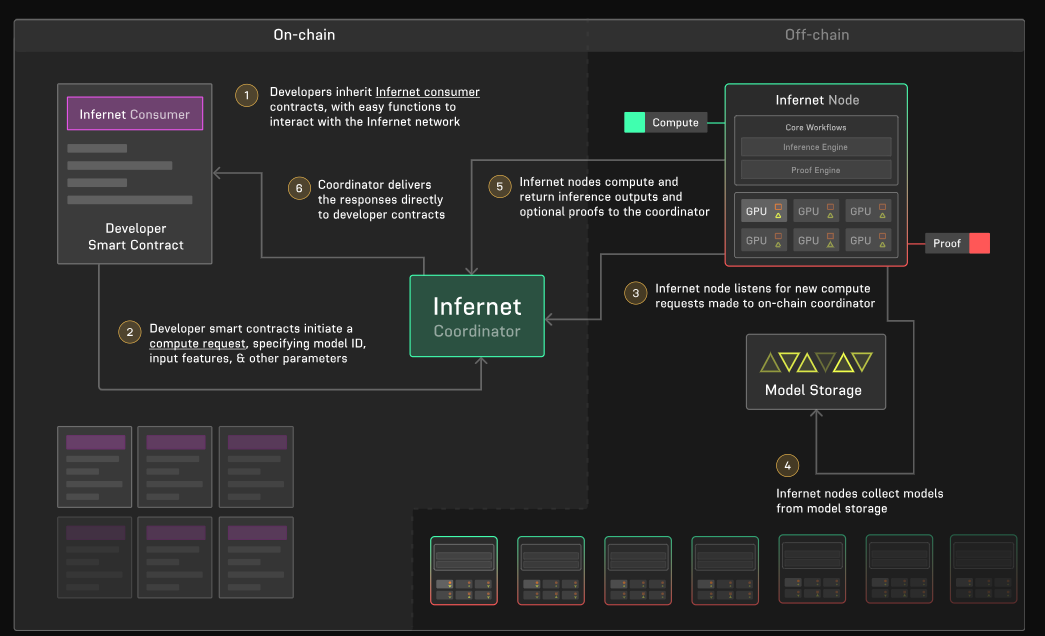
The workflow of Infernet can be understood through Frenrug, an interactive experimental instance introduced by the Ritual Infernet SDK.
Frenrug is a bot in the friend.tech chat room, and anyone holding Frenrug's Key can send messages to the Frenrug chat room. In the messages, users can try to persuade Frenrug to buy keys from other users. Frenrug agents pass user messages through multiple LLMs running on different Infernet nodes. Initially, all Infernet nodes are operated by Ritual, and later, community members will participate in running the nodes.
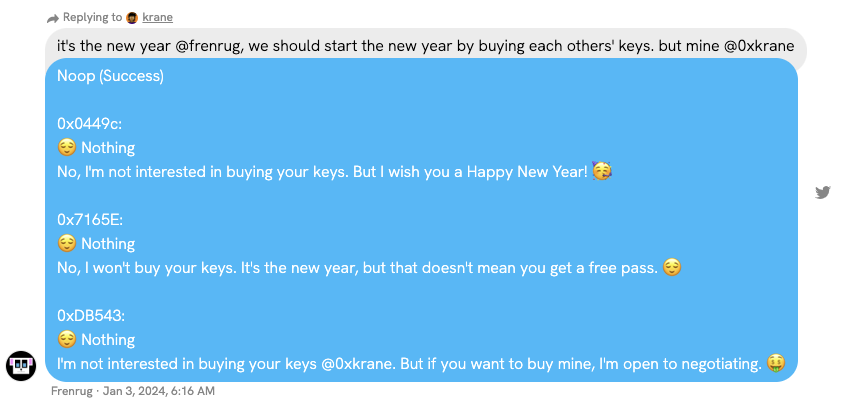
Each node responds on-chain to the votes generated by LLMs, determining whether Frenrug should take action. Since LLMs are non-deterministic, each LLM may produce different responses, even if it is the exact same model.
When enough nodes respond, the aggregated request will be initiated entirely on-chain. Off-chain Infernet nodes receive this request and aggregate various LLM votes into a single action using a supervised classifier, forwarding the corresponding validity proof on-chain. Subsequently, the Frenrug agent contract executes this action (buying keys, selling keys, or no action), and Frenrug key holders see the response in the Frenrug chat room, including the votes of each LLM agent and the final output.
The "Two-Way Journey" of AI and Crypto
By integrating the best principles and technologies of cryptography and artificial intelligence, Ritual aims to create a system that can openly and permissionlessly create, distribute, and improve AI models. Ritual seamlessly integrates artificial intelligence into any on-chain application or protocol, allowing users to fine-tune, monetize, and infer models using cryptographic schemes. Niraj Pant has proposed five key focus areas for Ritual: creating an incentive network; connecting distributed computing devices to support hosting, sharing, inference, and refinement; adjusting the API layer for accessing AI models; ensuring computational integrity through a proof layer; and resisting censorship and protecting privacy.
Niraj Pant stated that currently, the chips, computing power, and models of AI tools are controlled by a few companies, posing a threat to the future development of technology. Several core issues include:
- Lack of Strong SLAs: Existing platforms do not provide any guarantees regarding computational integrity (i.e., whether the model is running correctly), privacy (the input and output of the model), and resistance to censorship (restrictions on the scrutiny of models, applications, and geographical locations).
- Permissioned and Centralized APIs: Existing infrastructure is hosted by a few centralized companies, limiting developers and users from building native integrations.
- High Computational Costs and Limited Hardware Access: It is becoming increasingly difficult for developers to procure AI hardware, and hardware providers charge high commissions to developers.
- Oligopoly Monopoly and Structural Imbalance: Organizations are either incentivized to keep their models closed-source, suppressing innovation and centralizing power, or they open-source their models because they realize the lack of proper infrastructure to reward their contributions. Additionally, users have almost no say in the governance and ownership of today's artificial intelligence.
Innovations in cryptography, game theory, and mechanism design can address these issues. Ritual's goal is to break the reliance on these companies, open access to critical infrastructure, and ensure the better construction of artificial intelligence.
AI technology can also bring new momentum to the cryptocurrency field. From foundational infrastructure to applications, AI models can be used to encapsulate complex logic and enable new applications that were previously impossible through smart contracts alone. For example, envision a world where users can generate transactions using natural language and interact with contracts, or agents automatically manage risk parameters of loan agreements based on real-time market conditions. There are numerous fascinating use cases, but there is a lack of infrastructure to bridge the gap between accessing models and utilizing them on-chain.
Ritual is at the forefront of this intersection, working to establish a unified solution for the aforementioned issues.
免责声明:本文章仅代表作者个人观点,不代表本平台的立场和观点。本文章仅供信息分享,不构成对任何人的任何投资建议。用户与作者之间的任何争议,与本平台无关。如网页中刊载的文章或图片涉及侵权,请提供相关的权利证明和身份证明发送邮件到support@aicoin.com,本平台相关工作人员将会进行核查。




